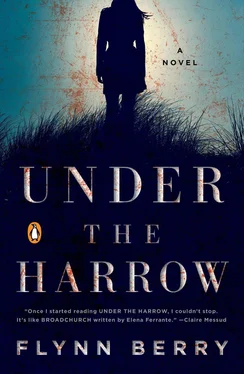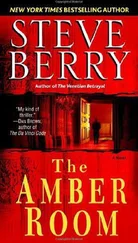“I wanted to see her house.”
He leaves the room. For a long time I sit with my hands on my lap. They’re watching me somewhere, on a video monitor, a small, still figure staring ahead. It must be meant to make me nervous, but it’s a relief to be alone. They have thirty-six hours to charge me.
His boss, DCI Bristowe, will have to approve. He might be in her office now. I imagine she has been watching us, and I wish she would interview me herself. We’ve never spoken, she can’t be convinced of my guilt. I imagine her in a suit, a coffee on her desk, rubbing her shoulders, wondering if she can go home. It will look bad for her, and her department, to charge two suspects that CPS declines to prosecute.
• • •
There isn’t a clock in the interview room. Moretti wears a watch but its face is hidden under his sleeve. I don’t know how much time passes. I look at the mirror to try to see shapes behind it. I listen for sounds in the building, and when I don’t hear any I become frightened that we are the only ones in it.
“Is Lewis here?”
“No. DS Lewis has been suspended.”
“Why?”
“Professional misconduct.”
• • •
They don’t let me sleep for very long. It seems like only a few minutes pass between when I enter the cell and when I am back in the room with Moretti. He drinks a tea and doesn’t offer me one.
“Tell me about your relationship with Paul Wheeler.”
I try to hide my surprise, but I’m sure Moretti caught it, a twitch. “We met for the first time a few weeks ago. I think he attacked Rachel in Snaith.”
“He sent you roses.”
“He was harassing me. He sent the flowers to scare me.”
“Have you given Paul Wheeler any gifts? Have you lent or given him money?”
“No.”
“What are the terms of your agreement?”
“We don’t have an agreement.”
Moretti stands and stretches. There are wrinkles on the back of his suit jacket. “Nothing you did with Lewis was illegal,” he says, “but a jury will want to know why you slept with a case detective so soon after the murder.”
• • •
Later, he pulls a sheet of paper toward him and lowers his head to read. “‘I’m unhappy. I don’t feel like myself. I’m scared this won’t go away.’” He continues, and I lean forward, my hands twisting on my lap. He’s reading my psychologist’s notes. I thought they were sealed.
Moretti finishes reading and we sit with the paper on the table between us. “When you found out that Rachel caused so much unhappiness, you must have been very angry with her.”
“I didn’t know about Liam until you told me.”
He looks again at the mirror. Moretti still hasn’t mentioned the weapon. If the murderer used a knife from her house, my fingerprints might be on it. I’ve cooked using those knives.
A DUTY SOLICITOR COMES to see me. She introduces herself as Amrita Ghosh. “Have I been charged?” I ask.
“No,” she says. “I’m here to explain what might happen next.”
Her voice is candid and direct, and she meets my eyes. I can’t tell if she thinks I’m guilty. I suppose she might not have an opinion. She is here to share general information, not offer me advice. She might not have reviewed the case in any detail.
She starts with what I already know. After my arrest, the police have thirty-six hours before they must either charge or release me. If I am released, the police will likely continue to consider me as a suspect and to build the case against me, unless new evidence eliminates me.
The solicitor doesn’t do anything to confuse me. She never asks how I am coping. She makes it clear that she is a neutral party. If I am charged, I will remain in custody while an Oxfordshire prosecutor decides if the evidence against me is strong enough to move to trial. If it is, I will appear before a magistrate to enter a plea. If I plead guilty, negotiations will begin between my defense counsel and the prosecutor. If I plead not guilty, the magistrate will either set bail or remand me into custody until the trial.
“It is my duty to tell you that there is a sentence reduction for a guilty plea. The prosecutor might also adjust the charge from murder to manslaughter. It depends on the details of the offense.”
“What’s the average length of time in prison after a guilty manslaughter plea?”
“Three years.”
“What’s the average if you plead not guilty to murder and are convicted?”
“Twenty years.”
She holds my eyes. I don’t think she believes I’m innocent.
• • •
The difference between being released at thirty-three or forty-nine.
I won’t do well in cross-examination. At York Crown Court some defendants remained composed and patient. Others became emotional, to the jury’s distaste. The juries appeared to prefer when defendants kept calm, and I won’t be able to.
The visit from the duty solicitor was not about due process, it was the first application of pressure. They could have waited until I was charged, but they want to be sure I have time before the magistrate’s hearing to consider it. Three or twenty years.
“ARE YOU TIRED?” he asks.
“Yes.”
He smiles at me. For a moment I think he will let me go. The silence stretches between us.
“Your fingerprints are on the banister post.”
I watch his expression closely. “Which one?”
“The one you tied the dog’s lead around.”
“I must have touched it on a different visit.”
“They’re close to the ground. To reach there, you would have had to kneel on the floor.” He straightens his tie. “One of the prints is in the dog’s blood.”
“Show me a photograph of it.”
He leaves the room. My breathing turns loud and ragged. I can’t remember if detectives are allowed to lie during an interview. It’s such a huge point of law, I can’t believe I don’t know it. He might be allowed to say anything.
The minutes stretch on. I try to stare through the black mirror, and my reflection is appalled and ashen. He wants to retire. How important is it to him to leave after a success? I never considered it before.
I didn’t touch the banister post that day, but I did touch the dog. I put my hand against his side while he was hanging. I knew he was dead, but I still wanted to comfort him.
I must have left fingerprints somewhere else in the house. All he would have to do is change the label on where the print was found. The house has been industrially cleaned now. I won’t be able to prove him wrong.
MORETTI DOESN’T RETURN, and a constable leads me to the cell.
He’s fitting me up. When I asked about the defensive injuries, he shrugged. He might decide to remember a scratch or a bruise on me.
I don’t sleep. Instead I pretend to be a juror, listening to the evidence and the witnesses. I don’t know if it will be clear that the police are crooked, or if something about me will make it easy for them to believe.
• • •
A constable unlocks the door and says, “Follow me, please.”
Sunlight falls over us as we walk down the corridor. It must be Thursday morning. I can’t tell from her face if in a few minutes she will charge or release me.
An officer hands me my clothes and bag. Moretti isn’t in the room. I wonder if he’s watching on a monitor somewhere else in the building. I’m not being charged. He must have lied about the prints on the banister.
I hurry away from the police station. The morning is cool and damp, the sun behind a scrim of gray cloud. Giddiness bursts up my legs and into my chest. I dig my nails into the sides of my arms, sailing down the road.
Читать дальше












